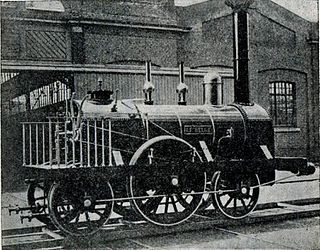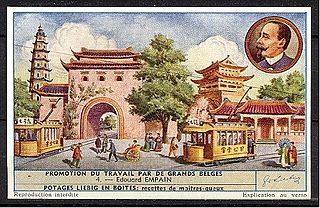Related Research Articles

The National Company of Light Railways was a state-owned transportation provider which comprised a system of narrow-gauge tramways or local railways in Belgium, which covered the whole country, including the countryside, and had a greater route length than the mainline railway system. They were 1,000 mmmetre gauge and included electrified city lines and rural lines using steam locomotives and diesel railcars; half the system was electrified.

The General Confederation of Liberal Trade Unions of Belgium is the smallest of Belgium's three major trade union federations.

The Belgian Labour Party was the first major socialist party in Belgium. Founded in 1885, the party was officially disbanded in 1940 and superseded by the Belgian Socialist Party in 1945.

Belgium was heavily involved in the early development of railway transport. Belgium was the second country in Europe, after Great Britain, to open a railway and produce locomotives. The first line, between the cities of Brussels and Mechelen opened in 1835. Belgium was the first state in Europe to create a national railway network and the first to possess a nationalised railway system. The network expanded fast as Belgium industrialised, and by the early 20th century was increasingly under state-control. The nationalised railways, under the umbrella organisation National Railway Company of Belgium (NMBS/SNCB), retained their monopoly until liberalisation in the 2000s.
The Société des Transports Intercommunaux de Charleroi, abbreviated and referred to as STIC, was a company operating a local and regional public transport network in Charleroi, Belgium. The company was active from 1962 until 1991, when it was merged with the Charleroi part of the SNCV to form the TEC Charleroi, the current public transport company in Charleroi.
The Union of Mineworkers of Belgium was a trade union representing coal miners in Belgium.

Corneille Mertens was a Belgian trade unionist and politician.
The Union of Clothing Workers and Kindred Trades in Belgium was a trade union representing workers in the clothing industry in Belgium.
The Food, Hospitality and Services Union is a trade union representing workers in the food and service sector in Belgium.
The Belgian Union of Transport Workers is a trade union representing transport workers in Belgium.
The Union of Belgian Metalworkers (Dutch: Centrale der Metaalindustrie van België, CMB; French: Centrale de l´Industrie du Métal de Belgique is a trade union representing workers in metal and related trades in Belgium.
The General Union of Public Services is a trade union representing public sector workers in Belgium.
The Paper and Publishing Industry Union was a trade union representing workers in the graphical industries in Belgium.
Anarchism spread into Belgium as Communards took refuge in Brussels with the fall of the Paris Commune. Most Belgian members in the First International joined the anarchist Jura Federation after the socialist schism. Belgian anarchists also organized the 1886 Walloon uprising, the Libertarian Communist Group, and several Bruxellois newspapers at the turn of the century. Apart from new publications, the movement dissipated through the internecine antimilitarism in the interwar period. Several groups emerged mid-century for social justice and anti-fascism.
The Belgian Typographical Federation, also known as the Belgian Book Printers' Union, was a trade union representing printers in Belgium.
The Union of Bookworkers of Belgium was a trade union representing printers and bookbinders in Belgium.
The Socialist Union of Education Workers was a trade union representing workers in the education sector in Belgium.
The National Union of Rail, Post, Telegraph, Telephone, Marine and Aviation Workers was a trade union representing transport and communications workers in Belgium.
The Central Union of Public Service Workers was a trade union representing public sector workers in Belgium.

The Empain group was a loose grouping of companies founded by Édouard Empain (1852–1929) of Belgium and controlled by the Empain family. From 1881 until merging with Schneider & Cie in 1969, the companies engaged in a broad range of activities including tramways, railways, electricity generation, construction and mining. The main areas of activity were Belgium and France, but the group also pursued opportunities in Russia, Egypt, China and elsewhere, and played a large role in the development of the eastern Belgian Congo.
References
- ↑ "BELGISCHE CENTRALE VAN TRAM- BUURTSPOORWEG- EN AUTOBUSPERSONEEL / CENTRALE BELGE DU PERSONNEL DES TRAMWAYS, VICINAUX ET AUTOBUS (1919-1967)". ODIS. Retrieved 28 January 2020.
- ↑ Ebbinghaus, Bernhard; Visser, Jelle (2000). Trade Unions in Western Europe Since 1945. Basingstoke: Palgrave Macmillan. p. 131. ISBN 0333771125.